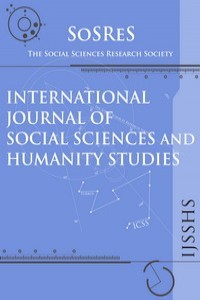STUDENT’S SOFT SKILL ACQUISITION IN AN OUTDOOR ADVENTURE EDUCATION EVENT OVER TWO YEARS OF PARTICIPATION
STUDENT’S SOFT SKILL ACQUISITION IN AN OUTDOOR ADVENTURE EDUCATION EVENT OVER TWO YEARS OF PARTICIPATION
Students, soft skills adventure education, OAE, recreation,
___
- Baker, J. P. (2015). Peer Leadership on the College Campus--Competencies and Skills for Success. International Journal of Leadership and Change, 3(1), 6.
- Bennett, R. (2002). Employers' Demands for Personal Transferable Skills in
- Graduates: a content analysis of 1000 job advertisements and an associated empirical study. Journal of Vocational Education and training, 54(4), 457-476.
- Bennett, S. (2004). Supporting collaborative project teams using computer-based technologies. Online collaborative learning: Theory and practice, 1-27.
- Chang, M.-M. (2005). Applying self-regulated learning strategies in a web-based instuction - An investigation of motivation perception, computer assisted language learning. doi:10.1080/09588220500178939
- Collins, R. H., Sibthorp, J., & Gookin, J. (2016). Developing Ill-Structured
- Problem-Solving Skills Through Wilderness Education. Journal of Experiential Education, 39(2), 179-195. Cooley, S. J. (2015). Developing groupwork through outdoor adventure education: a systematic evaluation of learning and transfer in higher education.
- University of Birmingham. Cooley, S. J., Burns, V. E., & Cumming, J. (2015). The role of outdoor adventure education in facilitating groupwork in higher education. Higher Education, 69(4), 582.
- D'Eloia, M. H., & Fulthorp, K. (2016). Preparing for the Profession: Practitioner
- Perceptions of College Student Preparedness for Entry-Level, Full-Time Employment in Municipal Recreation Agencies. Schole, 31(1). Ewert, A. W., & Sibthorp, J. (2014). Outdoor adventure education: Foundations, theory, and research: Human Kinetics.
- Germaine, R., Richards, J., Koeller, M., & Schubert-Irastorza, C. (2016).
- Purposeful Use of 21st Century Skills in Higher Education. Publication of National University, 19. Leech, N., & Onwuegbuzie, A. (2009). A typology of mixed methods research designs. Quality & Quantity, 43(2), 265-275. doi:10.1007/s11135-007-9105-3
- McEvoy, G. M., & Buller, P. F. (1990). Five uneasy pieces in the training evaluation puzzle. Training & Development Journal, 44(8), 39-43.
- Paisley, K., Furman, N., Sibthorp, J., & Gookin, J. (2008). Student learning in outdoor education: A case study from the National Outdoor Leadership School.
- Journal of Experiential Education, 30(3), 201-222. Prichard, J. S., Bizo, L. A., & Stratford, R. J. (2006a). The educational impact of team‐skills training: Preparing students to work in groups. British Journal of
- Educational Psychology, 76(1), 119-140. Prichard, J. S., Stratford, R. J., & Bizo, L. A. (2006b). Team-skills training enhances collaborative learning. Learning and Instruction, 16(3), 256-265.
- Robles, M. M. (2012). Executive perceptions of the top 10 soft skills needed in today’s workplace. Business Communication Quarterly, 75(4), 453-465.
- Roos, S., J, Van den Berg, L., Lennox, A., & Els, B. (2016). Campus Amazing
- Race as teaching tool: Sport student's perceptions of skills developed and applied. International Journal of Management and Applied Science, 2(3), 48-53. Savitz-Romer, M., Rowan-Kenyon, H. T., & Fancsali, C. (2015). Social,
- Emotional, and Affective Skills for College and Career Success. Change: The Magazine of Higher Learning, 47(5), 18-27. SRSA. (2012). National Sport and Recreation Plan. South-Africa.
- Wang, L., MacCann, C., Zhuang, X., Liu, O. L., & Roberts, R. D. (2009).
- Assessing teamwork and collaboration in high school students A multimethod Approach. Canadian Journal of School Psychology, 24(2), 108-124. Winston, R., Miller, T., Ender, S., & Grites, T. (1984). Developmental academic advising: Addressing students’ educational, career, and personal needs. San
- Francisco: JosseyBass. Young, M. E. (2015). Therapeutic recreation as a developing profession in South
- Africa. World Leisure Journal, 57(1), 34-45.
- Başlangıç: 2009
- Yayıncı: Sosyal Bilimler Araştırmaları Derneği
PERCEPTIONS OF HOUSEHOLD HEADS ON THE CAUSES OF CHILD POVERTY IN BOIPATONG TOWNSHIP
Steven H. DUNGA, Jabulile L. MAKHALİMA
POLITICS OF CLIMATE CHANGE: WHY SHOULD AFRICA MITIGATE?
T. S. MADZİVHANDİLA, F. NİYİMBANİRA
TEN HEURISTICS TO EVALUATE THE USER EXPERIENCE OF SERIOUS GAMES
RESISTANCE TO CHANGE IN GOVERNMENT: ACTORS AND FACTORS THAT HINDER REFORM IN GOVERNMENT
İbrahim DEMİR, Coşkun Can AKTAN
THE APPLE DOES NOT FALL FAR FROM THE TREE: CAN SOCIETY CORRUPT POLICE OFFICIALS?
EMPLOYEE PERCEPTIONS OF OCCUPATIONAL HEALTH AND SAFETY STANDARDS IN THE STEEL INDUSTRY
J. MOJAPELO, C. MAFİNİ, M. DHURUP
